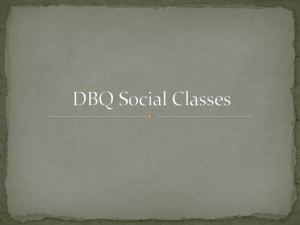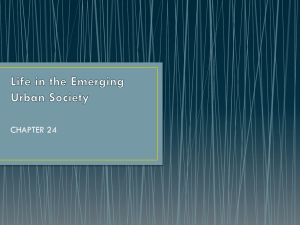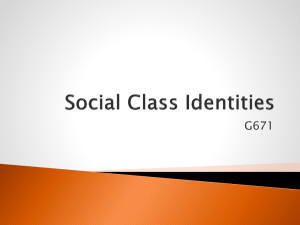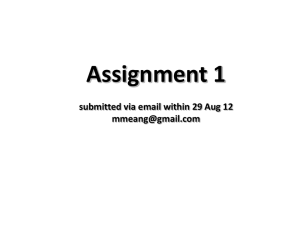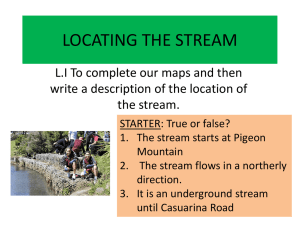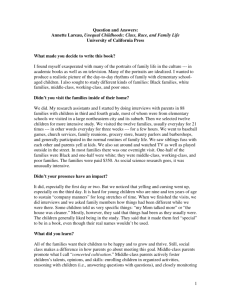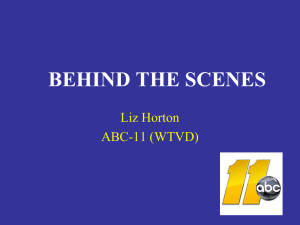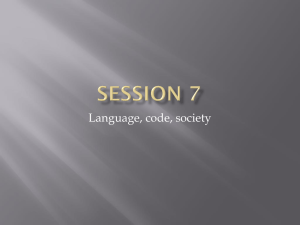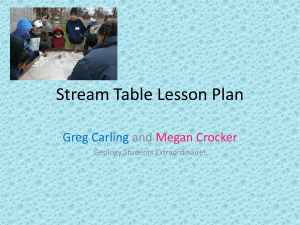Emer Smyth (ESRI) School factors and student outcomes: insights
advertisement
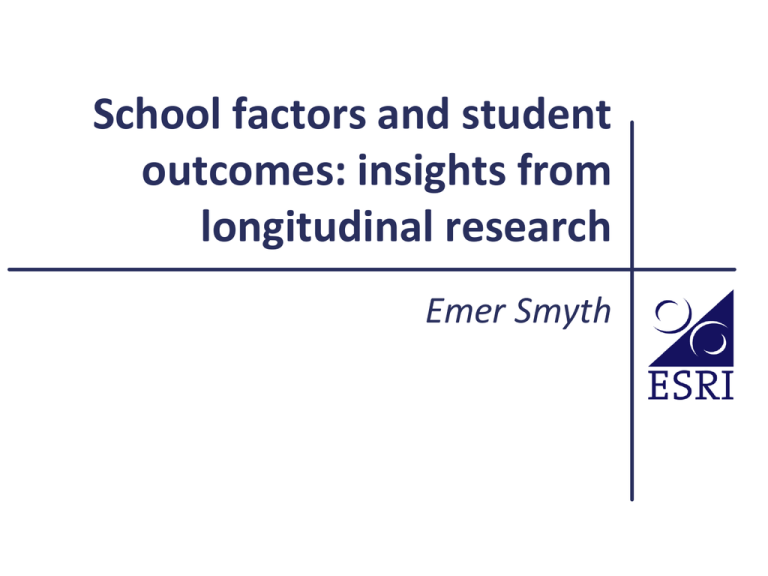
School factors and student outcomes: insights from longitudinal research Emer Smyth What can schools do? Education in a time of austerity But there are key areas in which research evidence can contribute to enhanced practice: 1. 2. 3. Ability grouping Approaches to teaching and learning School climate: day-to-day interaction between teachers and students Draw mainly on the Post-Primary Longitudinal Study but highlight potential of Growing Up in Ireland data Background to the Post-Primary Longitudinal Study The first longitudinal study exploring students’ experiences in Ireland Cohort of 900 students in 12 case-study schools Surveyed from 1st year to 6th year plus group interviews with students Follow-up of individual early school leavers Survey of, and interviews with, parents Unique insights - capture the student voice but multiple perspectives (principals, key personnel, parents) 1. Ability grouping in Ireland Reduction in the use of the streaming over time but increasingly concentrated in schools serving more disadvantaged populations Streaming has very significant consequences for student outcomes Streaming and JC Grades 8 7 6 5 4 3 2 1 0 Mixed ability Higher stream Middle stream Lower stream Early school leaving 70 60 50 % 40 30 20 10 0 Mixed ability Higher stream Middle stream Lower stream Number of higher level subjects by ability group 7 6 5 4 3 2 1 0 Mixed ability Higher stream Middle stream Lower stream Why impact of streaming? Access to higher level subjects Labelling: They are clever and we are dumb. (Dixon Street, coeducational school, working-class, lower/middle streams, 1st year) Student and teacher expectations: We don’t do our homework so we don’t get it. Teachers know we don’t do it so they don’t bother checking it. We don’t get homework. We never did get homework. We’re sort of the thick class. (Same group, JC year) Mixed ability base classes: setting Crucial issue is how setting is implemented Complex interaction between allocation policy, teacher and student expectations Different pattern of higher level take-up among schools serving similar groups of students: timing, ‘rationing’, role of teachers and students Number of higher level subjects by school (second lowest reading quintile) 9 8 7 6 5 4 3 2 1 0 Lang St Barrack St Dixon St Working-class Hay St Dawes Point Dawson St Park St Belmore St Mixed Wattle St Fig Lane Middle-class 2. What is good teaching? Teaching methods Clear explanation If they explain things well enough for the student to understand. If they have a second way of explaining it maybe; if you didn’t get it the first way, they can tell you the second way. (Hay Street, coeducational school, working-class, LC) Preference for active learning, fun I remember the [teacher] came in and she had like, not games but … I think that stuck in my head more. Like cards, like a picture and the French underneath. It's more like fun to remember, when you do it in a fun way. (Harris Street, girls’ school, middle-class, JC) Being allowed to express opinions; interactive What is good teaching? Teacher qualities Enthusiasm for the subject Respect A caring environment An orderly environment [A good teacher is] One that actually cares about the students, whether or not they do well in their exams as opposed to just going in for the forty minutes, teaching and then leaving. Yeah, they have to have patience as well. (Fig Lane, coeducational school, middle-class, LC) What is bad teaching? Didactic methods; reading from a book Lack of respect for students I don't know, she [the teacher] doesn't explain things, she just kind of puts it there and do it, do it and that's it, she doesn't explain it, it’s like do it and you’re just sitting there looking at it and then she gives out to you. (Dixon Street, coeducational school, working-class, JC) Because when they give out to you, you can't concentrate, well I can't. Because when a teacher gives out to you you're in a fuss then with them and then you can't just sit there and concentrate then after that … You just won't work for them because they're roaring at you. (Barrack Street, girls’ school, working-class, JC) Teaching in the exam years Junior Cert students contrast ‘good teaching’ with the exam focus in 3rd year You used to do fun things in class, they'd come in and say let's play games. If you say it this year you get like stared at, what do you think you are? (Harris Street, girls’ school, middle-class, JC) By 6th year, many view teaching to the test as a signal of a good lesson; more evident for middle-class students with high aspirations Like some teachers kind of go off the point sometimes and just waffle on about pointless things that isn’t on the course and stuff. (Fig Lane, middle-class coeducational school, LC) 3. School climate and support structures Changes in student-teacher relations 3 2.5 2 1.5 1 0.5 0 1st year (September) 1st year (May) 2nd year Positive JC year Negative 5th year LC year Liking school and teachers 3.5 3 2.5 2 1.5 1st year (Sept) 1st year 2nd year (May) Liking school JC year 5th year Liking teachers LC year Student disaffection Emerging dynamic of ‘giving out’ and ‘acting up’ Negative interaction increases more in workingclass schools and in lower streamed classes School drives you mad, it actually would, the teachers, if you'd better teachers there would be no one getting in trouble. When you come back at the start of the year you’re alright for a while. You calm down but then it starts building up through the year because you’re so bored of school and you want to get out of it. (Lang Street, working-class boys’ school, middle stream class) Impact of school climate School completion: negative relations with teachers a dominant theme in early leaver accounts I hit third year and I just started not getting on with the teachers and all. I kept getting thrown out of classes and suspended all and I just hated it and I hate that school. (Elaine, Dixon Street, Senior Cycle Leaver) The teachers say stuff to you like, you know kind of put you down … so then you feel like oh I haven’t got the teacher on my side, they don’t want to teach me so like, is there any point being here at all. (Eric, Argyle Street, Senior Cycle Leaver) Educational achievement: negative interaction and underperformance Personal and social development: stress levels; self-image, including capacity to cope with schoolwork Student engagement at primary level (GUI) 100 90 80 70 60 % 50 School 40 Teacher 30 20 10 0 Prof./manag. Non-man/sk. Semi/unsk Never worked Always/sometimes like Transition to second-level (GUI) Liking school 'very much’ at 13 years of age 40 35 30 % 25 20 15 10 5 0 Male Female Gender Prof./manag. Non-man./Sk. Semi/unsk Social class Never worked Lower sec. Degree Mother's education The way forward? Listening to student perspectives can contribute to policy development (national/school levels) Current mode of assessment is impacting on young people’s view of learning Positive features of junior cycle reform but importance of school-based as well as system change What can schools do?: Organisation Adopt a subject sampling approach so that students are not ‘locked into’ choices too early Move away from streaming to adopt a more flexible approach to ability grouping Promote access to higher level subjects from early in junior and senior cycle; hold high expectations for all students Support for differentiation within mixed ability classes; CPD and peer support What can schools do? Teaching and school climate Support staff in using diverse teaching methods to promote student engagement; role of teacher development and peer support Positive social climate: initial and continuing teacher education; school development planning Positive behaviour policy (clear and consistent approach) v. emphasis on sanctions; student involvement in school life
